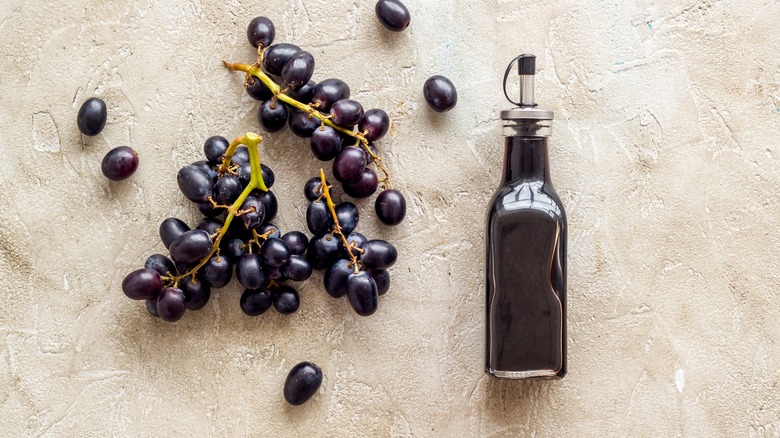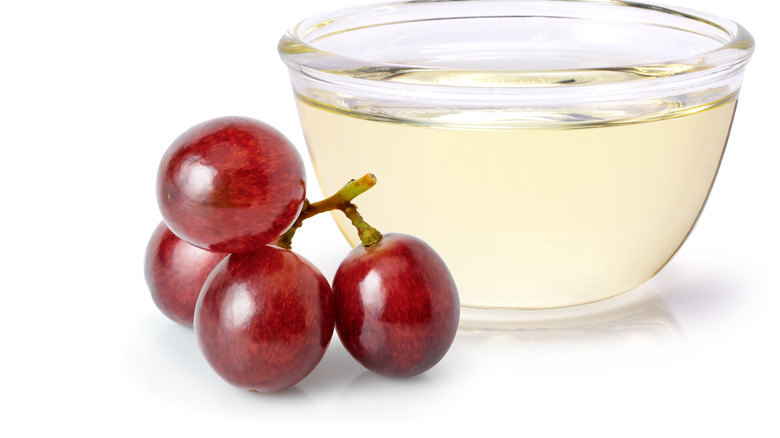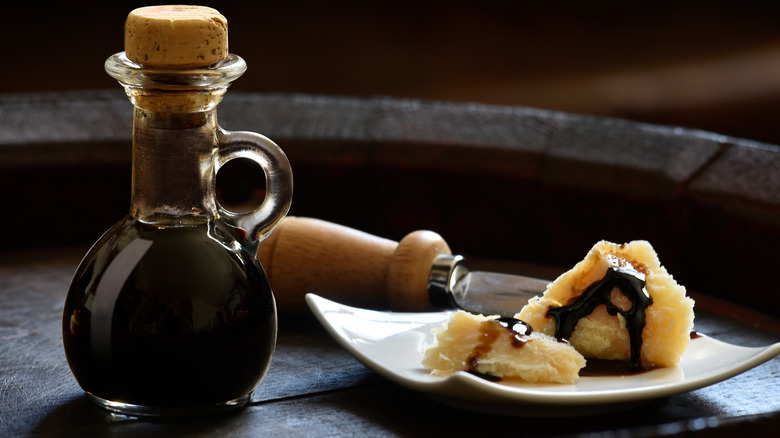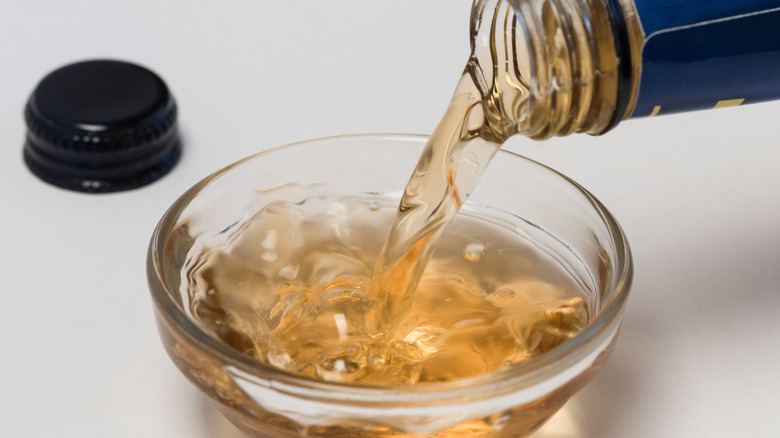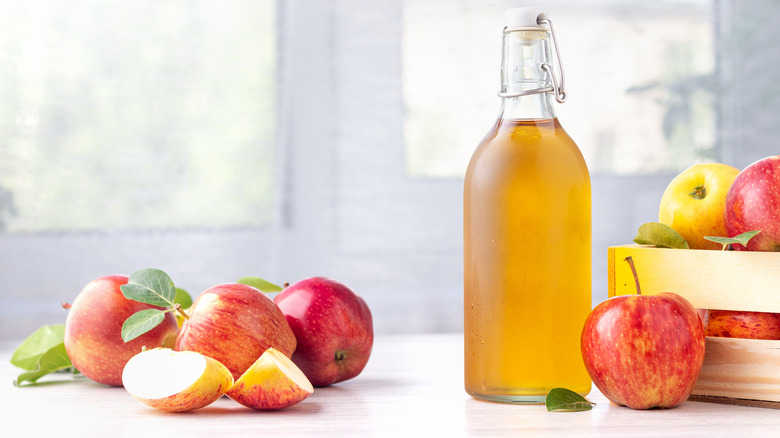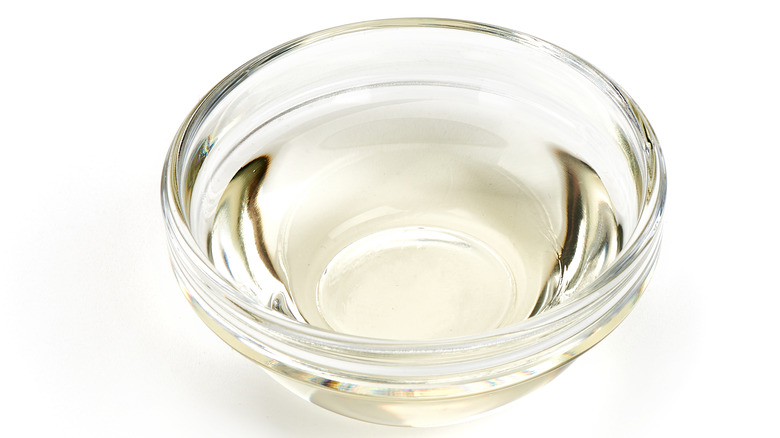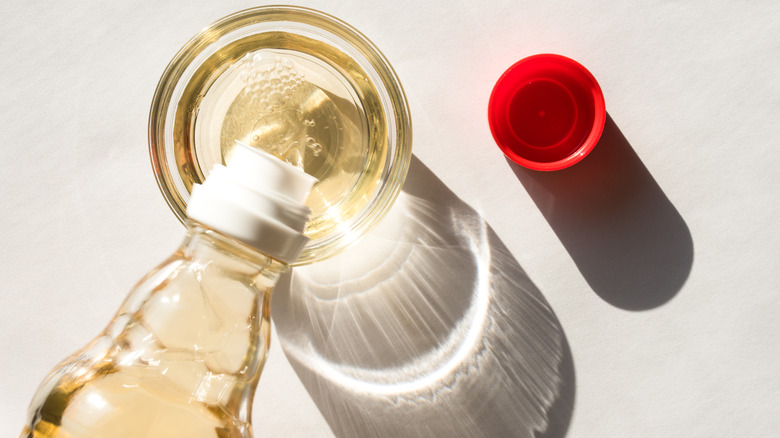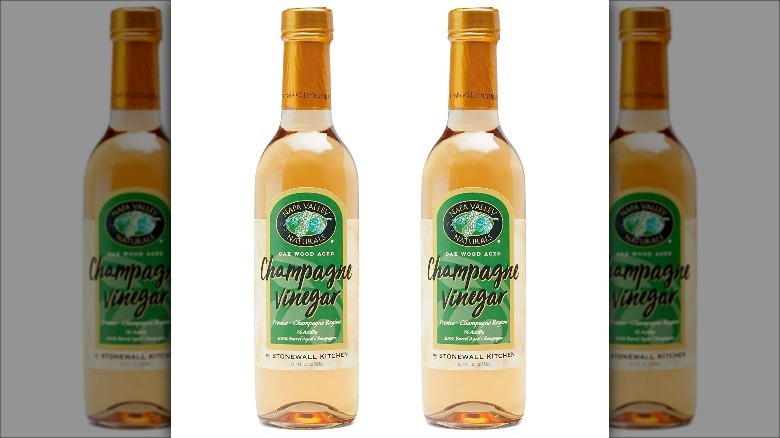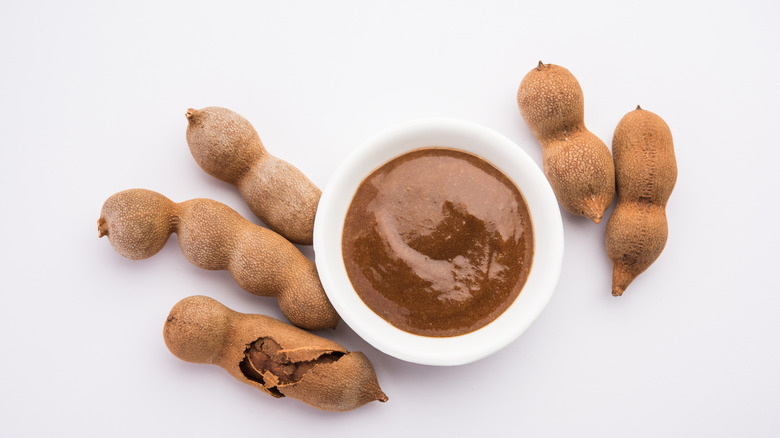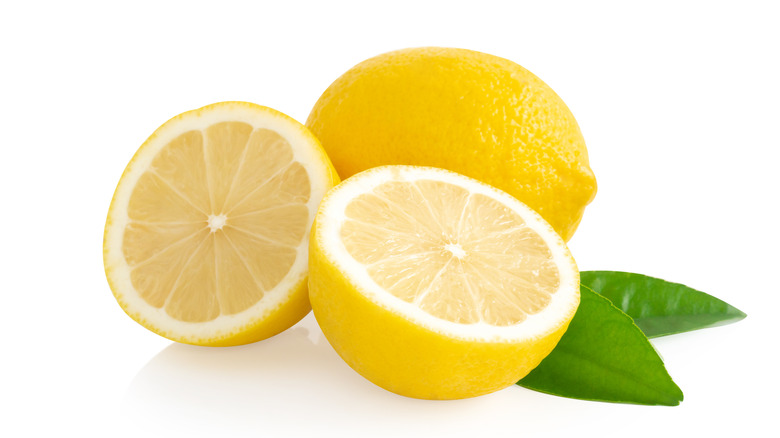The Absolute Best Red Wine Vinegar Substitutes
We may receive a commission on purchases made from links.
Red wine vinegar is a pantry staple that can add a punchy tang to everything from salad dressings to marinades. Its vibrant flavor makes it a culinary powerhouse, and its acidic qualities mean it usually can't be omitted from a recipe without causing a kitchen catastrophe. If you're in the middle of whisking up a vinaigrette and realize you don't have any red wine vinegar on hand, your first instinct might be to panic. However, all is not lost and a trip to the grocery store isn't inevitable. There are a handful of other ingredients you most likely already have in your kitchen that can be used as a substitute.
Before you start swapping, it's helpful to understand how red wine vinegar is made and how its distinctive qualities impart flavor into various dishes. Red wine vinegar is made by fermenting the alcohol in red wine into acetic acid. This type of acid gives the vinegar its signature aroma and taste — fruity and balanced with a fuller body than other types of vinegar. This makes it perfect for bold sauces and salad dressings, as well as for tenderizing red meat.
So, even though red wine vinegar can help turn a basic Greek salad into a dish no one can stop eating, there are ways to replicate its signature acidity and brightness if you don't have any on hand. Since there are a variety of red wine substitutes out there, it's helpful to consider all your options before you make the swap.
White vinegar with red wine
Combining these two ingredients might seem too simple to be true. However, when mixed correctly, a blend of basic white vinegar and red wine is actually a great substitute for the real deal. White vinegar is extremely sharp and acidic but offers very little in terms of depth of flavor. The addition of red wine is a game-changer and adds the fruitiness and body necessary to mimic the taste of red wine vinegar (via Food.com). Not to mention, it's a great way to use up the dregs of a bottle that's on its last legs.
To nail the ratio, simply mix one part red wine with three parts white vinegar. For best results, allow the mixture to sit for a few hours so the flavors can meld (you can also get creative and add garlic or herbs), and then use it exactly like you would red wine vinegar.
Balsamic vinegar
Unlike its cousins, balsamic vinegar is made from grape must, which comes from crushed grapes and includes seeds, stems, and skins. Its unique composition gives it a sweet, dark flavor and more syrupy consistency. As the vinegar ages, the sweeter and thicker it gets, which won't lend well to replacing red wine vinegar. Balsamic that's been aged is also more expensive, which is just another reason why using a mid-range product is a better bet for a red wine vinegar substitute.
It's important to bear in mind that since balsamic is significantly sweeter, the other sugary components of your dish should be reduced to retain balance. If your salad dressing calls for sugar, for example, you should use less when using balsamic in place of red wine vinegar.
For best results, substitute an equal amount of balsamic vinegar for red wine vinegar in your recipe, but reduce or omit other sugary ingredients like honey or maple syrup (via Public Goods).
Sherry vinegar
It makes sense that sherry vinegar would be a good red wine vinegar substitute since they share fermented grape juice roots. In terms of flavor, it falls somewhere between red wine vinegar and balsamic. It's not as harsh as the former, but less sweet than the latter. This means you can substitute sherry vinegar for red wine vinegar (and vice versa) in most dishes without compromising the overall integrity of the dish or necessitating significant adjustments.
One thing to keep in mind is that sherry vinegar can be expensive since it's imported from Spain and subject to minimum aging requirements. Despite having a price tag that's heftier than red wine vinegar, sometimes you can't put a price on not having to run out to the grocery store mid-recipe.
When opting for sherry vinegar as a substitute for red wine vinegar, use an equal amount, but consider slightly reducing other sweet components of your dish.
Apple cider vinegar
Whether you're drinking apple cider vinegar or adding it to a corn salad recipe, your palate will be treated to a fruity and sharp punch. Just like red wine vinegar, its flavor is derived from the fruit from which it was fermented. This means that there is a notable apple-like quality, which can nicely mimic the fruity acidity of red wine vinegar.
Since the fruitiness of apple cider vinegar is very pronounced (similar to hard apple cider in nature), you should keep the overall flavors of your recipe in mind before you decide to use it. That being said, this is a powerhouse ingredient that's also touted for its numerous health benefits.
For best results, reduce the amount of vinegar the recipe calls for when swapping apple cider vinegar for red wine vinegar due to its potent flavor and fruit-forward characteristics. You can even add a splash of red wine to the mix to mimic the color, tone down the acidity, and balance the apple notes.
Raspberry vinegar
It's easy to see why you'd think raspberry vinegar would be made from fermented raspberries, but that's not the case. Instead, this fruity concoction is typically made by combining white wine vinegar and fresh berries (via The Guardian). There are a variety of raspberry vinegar options on the market, but it's also incredibly easy to make your own homemade version. Not only can this unique ingredient be used in place of red wine vinegar, but it's also the perfect addition to light, bright summer salads.
Raspberry vinegar can be used as a direct substitute for red wine vinegar, so simply swap out an equal amount anywhere it's called for in a recipe. Keep in mind that since it tends to be sweeter than its red wine counterpart, you may want to tone down the recipe's other sweet components — especially if the raspberry vinegar you're using is especially high in sugar.
White wine vinegar
It's probably not surprising that just like there's red and white wine, there's also red and white wine vinegar — and they can more or less be used as substitutes for one another in most recipes. Of the two, white wine vinegar is milder and lighter in body. This means it won't overpower other flavors and can be well-suited for a variety of dishes. On the other hand, its relatively muted flavor means the acidity is more pronounced, so it tastes harsher than its red wine counterpart.
If you think about these two kinds of vinegar in the same way you'd think about pairing wine and food, it's easy to conceptualize white wine vinegar is better suited for lighter fare like chicken while red wine vinegar is the priority for red meat marinades. However, just like how wine is versatile, so is vinegar, and most recipes will fare just fine if you swap red for white. However, LifeSavvy recommends adding a bit more white wine vinegar if you're substituting it for red wine vinegar to make up for the flavor intensity disparity.
Rice wine vinegar
A staple in many Asian cuisines, rice wine vinegar (also known as rice vinegar) is made from fermented rice. This ingredient isn't as harsh as other types of distilled vinegar and is sweeter and less acidic than options made from wine.
If you're purchasing a bottle, be sure to keep in mind this important distinction: There are two types of rice vinegar available in most grocery stores. The first kind is unseasoned rice wine vinegar, which is what you'll want to use as a substitute for red wine vinegar. The second type is seasoned rice vinegar, which includes added sugar and salt — and therefore should not be used as a swap. Seasoned rice wine vinegar is a great addition to many dishes, but the added flavors will throw your recipe out of balance significantly.
Once you've ensured you're using unseasoned rice vinegar, you should use slightly more of it than the amount of red wine vinegar that was originally called for due to its mild, mellow flavor.
Champagne vinegar
Best known as the star ingredient in Champagne vinaigrette, this flashy-sounding vinegar variety adds a bright, zingy flavor to everything from salad dressings to chicken dishes. It gets its name from the grapes from which it's distilled — pinot noir and chardonnay. Bubbly-lovers already know that these are the same grapes that are used to make Champagne, which explains the correlation.
Champagne vinegar tends to be light, mild, and floral. It lacks the same bracing acidity and boldness of red wine vinegar, but it still contains fruit flavors and an overall brightness. Since it's much more mellow than red wine vinegar, it should be used in dishes where the vinegar isn't the leading, predominant flavor or ingredient.
When using Champagne vinegar as a red wine vinegar substitute, you should start by swapping an equal amount. After initially subbing out equal parts, taste the dish (if possible) and add more champagne vinegar if the flavor is flat.
Tamarind paste
Other types of vinegar aren't your only option for substituting the red wine variety. If you happen to have it on hand, sour, citrusy, and tangy tamarind paste can be used in its place.
Tamarind paste comes from the fruit of the tamarind tree, scientifically known as Tamarindus Indica (via Britannica). It's commonly used in Thai, Mexican, and Vietnamese cuisines, and has both sweet and savory applications. Its strong flavor means this substitute doesn't work well in certain recipes (like salad dressings), but it's perfect for tenderizing red meat and for marinades. Since tamarind paste is highly acidic, its organic components help keep proteins tender and juicy (via MasterClass).
For best results, use a very small amount of tamarind paste in place of the red wine vinegar. You can add more as needed, but tamarind's strong flavor can easily overpower other ingredients, so it's best to increase the amount gradually.
Lemon juice
If you're in a pinch, lemon juice can be used as a substitute for red wine vinegar. This isn't the most ideal option, since the citrus has a completely different flavor profile than vinegar, but it can work to add acidity, brightness, and tang to many dishes.
Lemon juice gets its acidity from citric acid, while the acidity in vinegar comes from acetic acid. If you can, use fresh lemon juice instead of store-bought when adding it to recipes. Allow your lemons to come to room temperature and then rolling the fruit prior to juicing. This will help extract more juice from each lemon, and make the overall process easier.
When using lemon juice in place of red wine vinegar, avoid doing so in recipes that call for large quantities of the latter, as well as in dishes or types of salad dressing where the flavor of red wine vinegar is pronounced (such as in an Italian vinaigrette). Start with a smaller quantity, then taste and adjust as needed.
